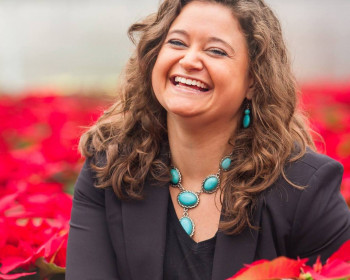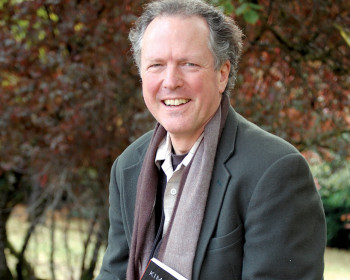Instructor Q&A: Challenging Implicit Bias and Cultural Norms in Fat Phobia, Dieting and Eating Disorders
Open gallery

We spoke with instructor Kyira Wackett, MS, LPC about her May 30th online workshops on the topic of fat phobia, dieting and the treatment of eating disorders.
Creating an Inclusive Community: Understanding Fat Phobia, Dieting & Eating Disorders will provide educators, social workers, volunteers and community members with what they need to know about eating disorders, body image distress, “fat phobia” and more. Becoming a More Inclusive Practitioner: Challenging Implicit Bias and Cultural Norms in Fat Phobia, Dieting and Eating Disorders is designed for counselors and therapists is designed to help deepen their understanding of eating disorders, disordered eating and body image distress from both a cultural and a diagnostic/treatment perspective.
“I am absolutely excited to help attendees grow their knowledge base to better understand what these issues look like, how to support someone who may be experiencing them, and the risks and impact. But more importantly, I am excited to get people engaged in talking about a topic that is too often ignored or bypassed due to discomfort or avoidance.”
Tell us a bit about your background and how you became interested in the treatment of eating disorders?
I am a licensed mental health therapist who specializes in the treatment of eating disorders, anxiety and trauma. I received my Masters degree in Counseling Psychology from the University of Wisconsin - Madison and moved to Portland, where I worked at a treatment facility for adolescents with eating disorders before moving back into private practice. I have an extensive background in mental health, working in nonprofit and community based centers including the National Alliance on Mental Illness throughout my life and before committing to pursuing a degree in counseling.
I have experienced significant trauma in my own life which eventually led to the development of anorexia nervosa. I struggled on and off with this disorder for a number of years and walked through the shame and isolation so deeply intertwined with it. When I was struggling, I found it to be incredibly disheartening the lack of providers trained in the treatment and identification of eating disorders. The therapists I saw and re-traumatization I incurred throughout my journey to recovery ignited a very strong passion in me to become a part of a solution to this problem. In my academic pursuits, I had a focus specific to eating disorders and completed my internship at an eating disorder clinic. My agreement with myself was that I would only pursue this specific field of therapy if I could do so through an unimpeded and untriggered lens. I had to be able to walk the line between using my experience as a support rather than a shift of focus to my clients. I had to be sure I would not be triggered and/or collude with my clients diagnoses. And I had to be able to see beyond the scope of my own experience. After seeing I could do those things, I committed fully to this work and have never looked back.
Why do you think it is important for all people, regardless of specialty or professional background, to be aware of biases (personal or systemic) in regard to body shaming, dieting, eating disorders and disordered eating?
We all have a body. We all eat food. As such, we all have a relationship with our bodies and food with which, none of us is immune to problems including poor body image, the pressure of diet culture, and a desire to look or be different. I can still remember the first time I became aware of my body through this lens of self deprecation. I was in middle school. And like many of us, that was the time we saw our bodies not as a tool but as a problem to be solved. While not everyone will develop a full-blown eating disorder or have distress that impacts the course of your daily lives, it is important we all make space to embrace that universality and then address the issues at hand that perpetuate this and create a community of idealization and exclusion.
What are some ways that the COVID-19 epidemic and periods of quarantine can impact and may continue to impact those struggling with diet, body image issues and disordered eating?
While there are a variety of issues people are facing right now, I think some of the biggest roadblocks I am seeing my clients hit include:
- Food Scarcity and Access to Safe and/or Binge Foods People with an already complicated relationship with food are now facing a lot of uncertainty and changes in proximity to food. The lack of access to food, especially with people with certain presentations of eating disorders can increase fear and anxiety as the rigidity around what they eat (often including the brand) is so severe they worry about veering off and gaining weight, opting to not eat rather than buy something different. Additionally, some people with eating disorders may see the food scarcity concerns as a reason they can skip getting food or limit what they purchase. For others who may experience binging, stocking up on food may be a severe trigger as they have continual access to and a loss of a structure around food. For example, someone who may struggle with binging may have created a routine when going to work or class to bring their meals and snacks with them so they are getting adequate nutrition without the trigger to binge. But, when they are at home all day, that plan no longer is in effect.
- Social Media Within a week of the stay-in-place orders, people began talking about the possibility of weight gain, the inability to exercise and the idea of a #quarantinebody started trending. For people with an eating disorder or severe body image distress, the fear of weight gain can cause severe anxiety which may lead to people increasing certain eating disorder behaviors, including restricting their food intake and increasing the amount of time they work out. I have had several clients make large purchases for exercise equipment and/or severely increase their restriction and compensation (purging, laxative use, overexercise) behaviors in response to the increased fear about weight gain.
- Isolation & Possible Quarantine with Triggering People The lack of access to regular and structured care can greatly allow for the exacerbation of symptoms. Without disruption of their ruminating thoughts and anxieties, many people have increased their engagement in a variety of eating disorder behaviors. Several clients of mine who had successfully limited or terminated use of body checking behaviors (ex. weighing oneself habitually) have relapsed and are now practicing them again out of fear of gaining weight and needing to “catch it” in time. Additionally, for many people, their triggers may be people in their home. Whether you are quarantined with a parent or caregiver, roommates, etc—if others are complaining about their bodies, talking about diets, or perhaps are the source of your shame, it is inevitable your eating disorder will come out stronger in response. This is problematic not only because of the increase in the behaviors but also the increased isolation and secrecy that can go along with it.
What can attendees expect from your workshop, and what do you hope they take away from it?
I think the biggest thing for me when it comes to presenting on any topic is to share information and cultivate a greater sense of curiosity and discussion. I am not the “end all, be all” when it comes to this topic. I am learning new things everyday both as a practitioner and as a member of a culture and community that has it’s roots in body shaming and deep pockets in the diet and fitness industry. I am absolutely excited to help attendees grow their knowledge base to better understand what these issues look like, how to support someone who may be experiencing this, and the risks and impact. But more importantly, I am excited to get people engaged in talking about a topic that is too often ignored or bypassed due to discomfort or avoidance. The reality is, we all have a body and we all have to eat. In some way, shape or form, all of us have had distress associated with one or both of those things. While it may not be clinically relevant or disrupting your life as bad as it may others, it is important we understand and come together to address this universal struggle.
Saturday, May 30 (3 CEUs or PDUs): Creating an Inclusive Community: Understanding Fat Phobia, Dieting & Eating Disorders
Saturday, May 30 (6 CEUs): Becoming a More Inclusive Practitioner: Challenging Implicit Bias and Cultural Norms in Fat Phobia, Dieting and Eating Disorders
Graduate Communications is located in room 205 of Rogers Hall on the Graduate Campus.
voice 503-768-6054
fax 503-768-6053
Graduate Communications
Lewis & Clark
615 S. Palatine Hill Road
Portland OR 97219

